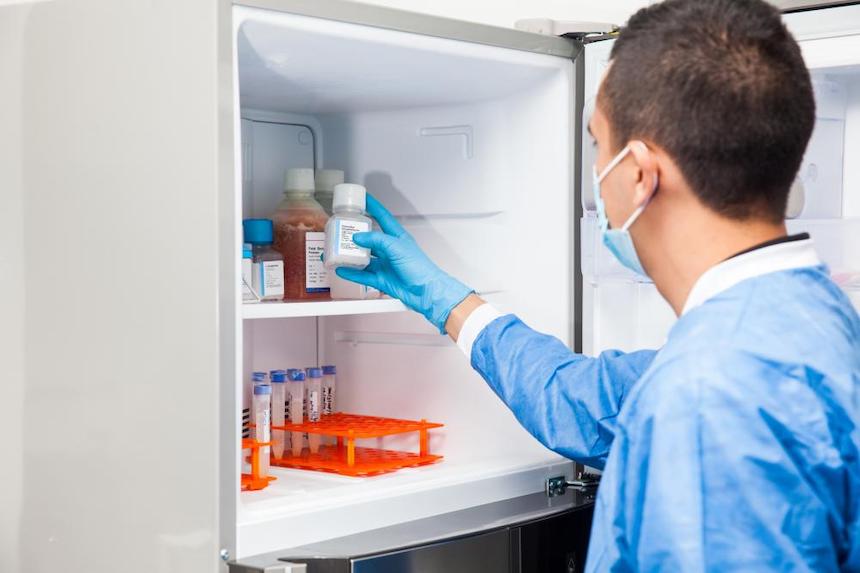
If your laboratory freezer malfunctions, its consequences can be far-reaching. It can lead to damaging the costly stored medicines or samples, leading to monetary losses. It can also lead to administering defective medication to people, who might get exposed to serious risks.
Defective medications call for replacement, entailing monetary losses.
Difference Between Household and Lab Refrigerators
There are remarkable differences between household and lab refrigerators. Moreover, you will find many models of different capacities and sizes.
Household refrigerators are not designed to store medical items. You will need biostorage services. Lab freezers are designed to meet strict storage standards. You need to keep medical items, such as pharmaceuticals, vaccines, blood, and plasma, in the right temperature environment. If the stored temperature goes beyond the prescribed range, the items can get damaged, becoming unfit for use.
There are regulations from competent authorities regarding storing medical items. Regulatory bodies, such as Food and Drug Administration (FDA) and the Centers for Disease Control and Prevention (CDC), govern the relevant regulations for storing temperature-sensitive medical products in healthcare facilities.
If your stored items get damaged, you will incur monetary losses in replacing them. Therefore, the cost and possible penalties due to improper storage justify investment in lab freezers and refrigerators.
You need to invest in a cold storage unit that lasts long and works perfectly. But, here comes a concern-buying the right cold storage unit calls for a detailed analysis of your needs vis-a-vis the prospective unit’s capabilities.
Here are the essential factors to consider before you purchase a cold storage unit for your laboratory:
The Types of Items You Will Store
The types of items you will store in your prospective cold storage unit are the criteria for choosing a cold storage unit.
If you store drugs, viruses, bacteria, cell preparations, and tissue samples, choose a cold storage unit that can provide -45 to -86 degrees C of temperature. Likewise, for storing blood products, vaccines, and biological samples, you need a cold storage unit that provides -30 to -45 degrees C. While you can choose a unit that provides -20 to 30 degrees C, if you will store enzymes and biological reagents.
For storing samples that are flammable or explosive, you need to go for special types of cold storage units to reduce accidents.
Energy Consumption
The energy consumption rate of your prospective cold storage unit is another crucial factor to consider before purchasing.
Many cold storage units consume enormous energy even with modern technological advancement, resulting in hefty electricity bills.
You must choose a cold storage unit that consumes electricity that will conform to your budget.
Location
Where in your laboratory you will place the cold storage unit is an important consideration before investing in a unit.
Finalize where you will store the unit–whether in a corner, under, or above the counter. It may be at any convenient place. It is important to finalize the place because it will dictate the size of the unit.
Storage Design
The design of your prospective cold storage unit plays a crucial role in holding your items. So, ascertain the design properly. For example, you may need a horizontal or vertical unit depending on what you will store in it.
Essential Features in Your Cold Storage Unit
The features with which cold storage units come are something you should consider before putting money in a unit.
While some features can be necessary for your laboratory, others are not. You will also find cold storage units with optional features. Check whether you require any of them.
But, ensure that your prospective cold storage unit comes with the following features:
Remote Temperature Monitoring
Ensure that your prospective cold storage unit bears the remote temperature monitoring facility. It will store temperature-sensitive items, so it will help if you monitor the internal temperature remotely. And you can take corrective measures if the temperature goes out of the prescribed range.
Audio and Visual Alert Systems
You will store temperature-sensitive items in your prospective cold storage unit. And if the temperature goes out of the prescribed range, they can get damaged. Therefore, you should choose a cold storage unit with audio and visual alert systems to alert you if the temperature goes beyond the prescribed range.
External Digital Thermometer
Your prospective cold storage unit should bear an external digital thermometer to enable monitoring of the internal temperature.
Types of Medical Refrigerators
There are many types of refrigerators to cater to various needs. Choose the one that meets your needs the best.
The following are the various types of medical refrigerators:
Chromatography Fridges
These refrigerators are mostly used in research laboratories, which require storage in precise and stable storage conditions.
Explosion-Proof Fridges
Such fridges are used to store samples that are combustible, flammable, or explosive. The peculiarities of explosion-proof fridges are that they do not have metal or electric parts inside to avoid sparks.
Blood Bank Fridges
These fridges are used to store blood samples and related samples such as plasma and bone marrow.
Lab Fridges
These fridges are cold storage units for labs and pharmacies. And, they can store different types of samples that meet the needs of laboratories.
Types of Freezers
Many types of freezers exist for pharmacies and labs, each catering to different needs. Typically, the following are the freezers:
Undercounter Refrigerators and Freezers
Undercounter freezers are small and can fit into tight spaces within a lab or a pharmacy. They have many similarities with upright fridges, the only difference being that they utilize shelf space instead of floor space.
Upright Freezers
These freezers are the most common cold storage units for labs and pharmacies. Upright freezers are fridges and freezers that usually have front doors that open outwards. These freezers come in many configurations and features: some upright freezers have fridge and freezer compartments.
Chest Freezers
Chest freezers are cube-like freezers that find use in pharmacies or laboratories. You can assess the interior of a chest freezer from the top. These freezers have no compartments and can store a large number of items. Besides, these freezers do not need precise organization or arrangement.
Low-Temperature Freezers
Low-temperature freezers operate at about -20 degrees C. These freezers are good options for labs and pharmacies that need moderately low temperatures. Remarkably, the price of such freezers is relatively low, and they call for low maintenance. Besides, they have moderate energy consumption.
Ultra-Low Temperature Freezers
Ultra-low temperature freezers provide shallow temperatures in the range of -45 to -86 degrees C. These freezers find uses in laboratories and pharmacies to store delicate and highly temperature-sensitive items.
But, the downside is that ultra-low temperature freezers consume enormous electricity. On the other hand, they come with more safety features than other features because they store more delicate, highly temperature-sensitive items.
We believe that this article will help you to select the best cold storage unit for your laboratory. But, ensure that you make the purchase from a reputable manufacturer for the apparent reason.






